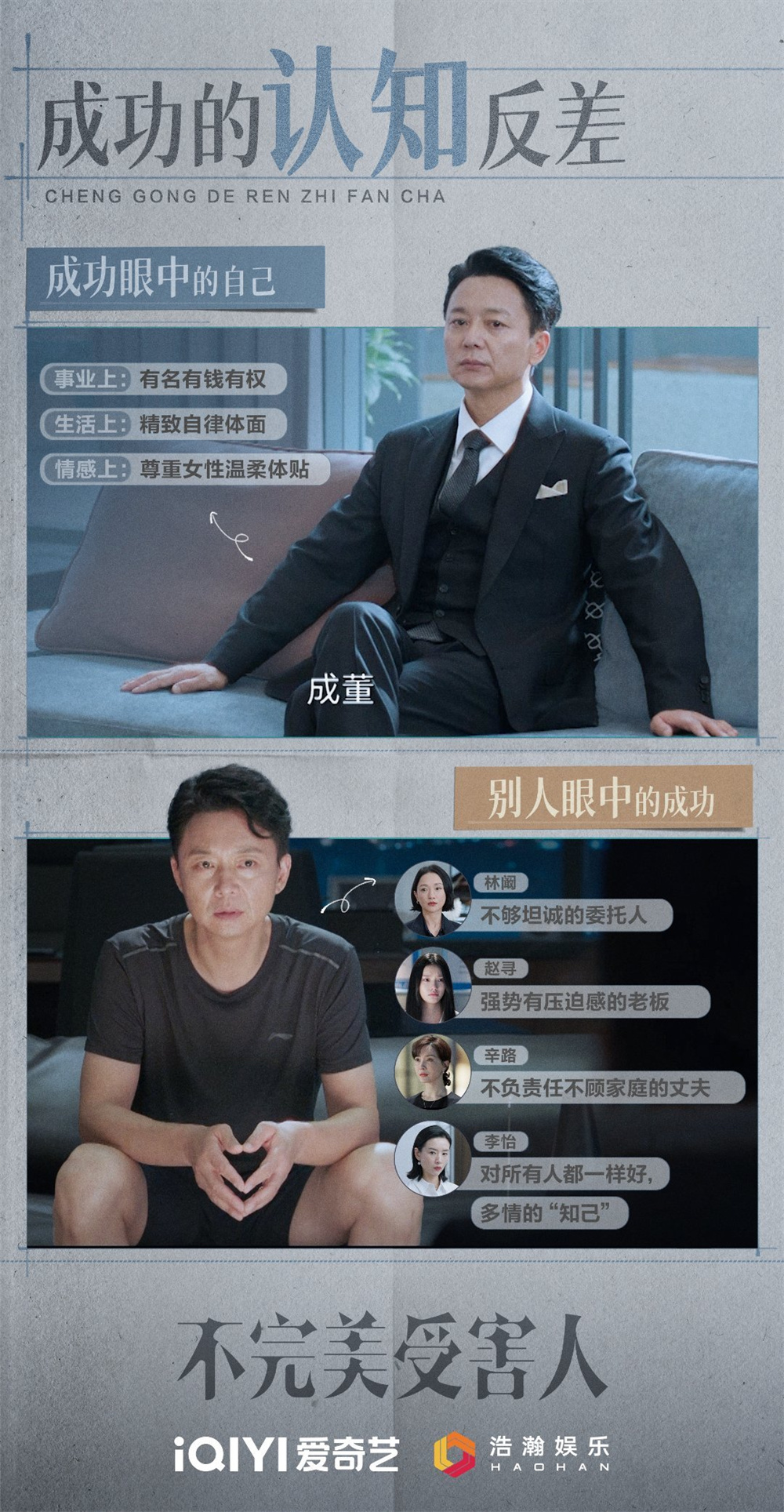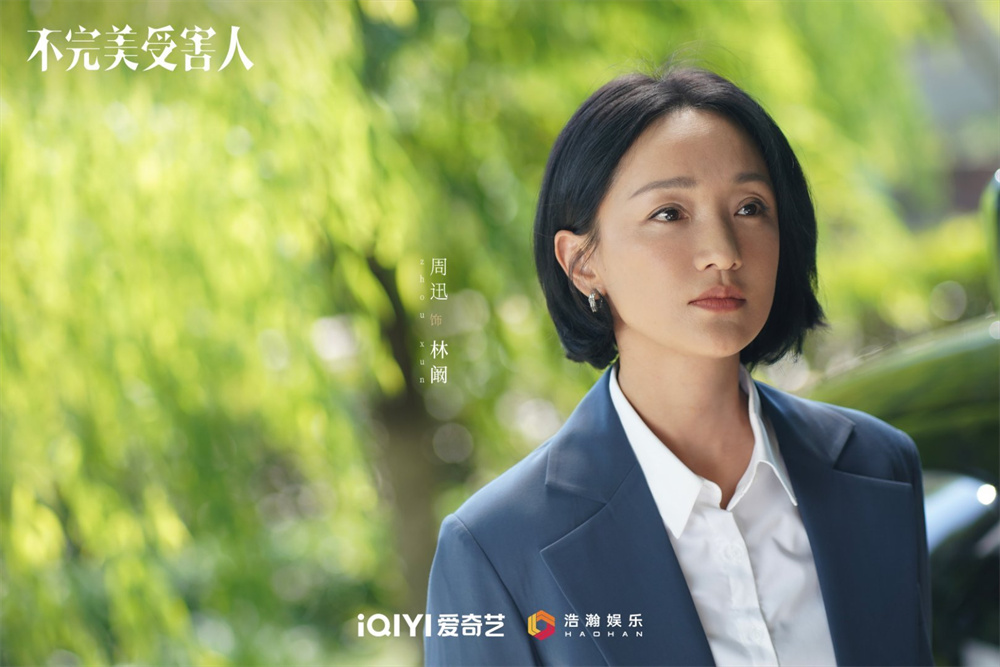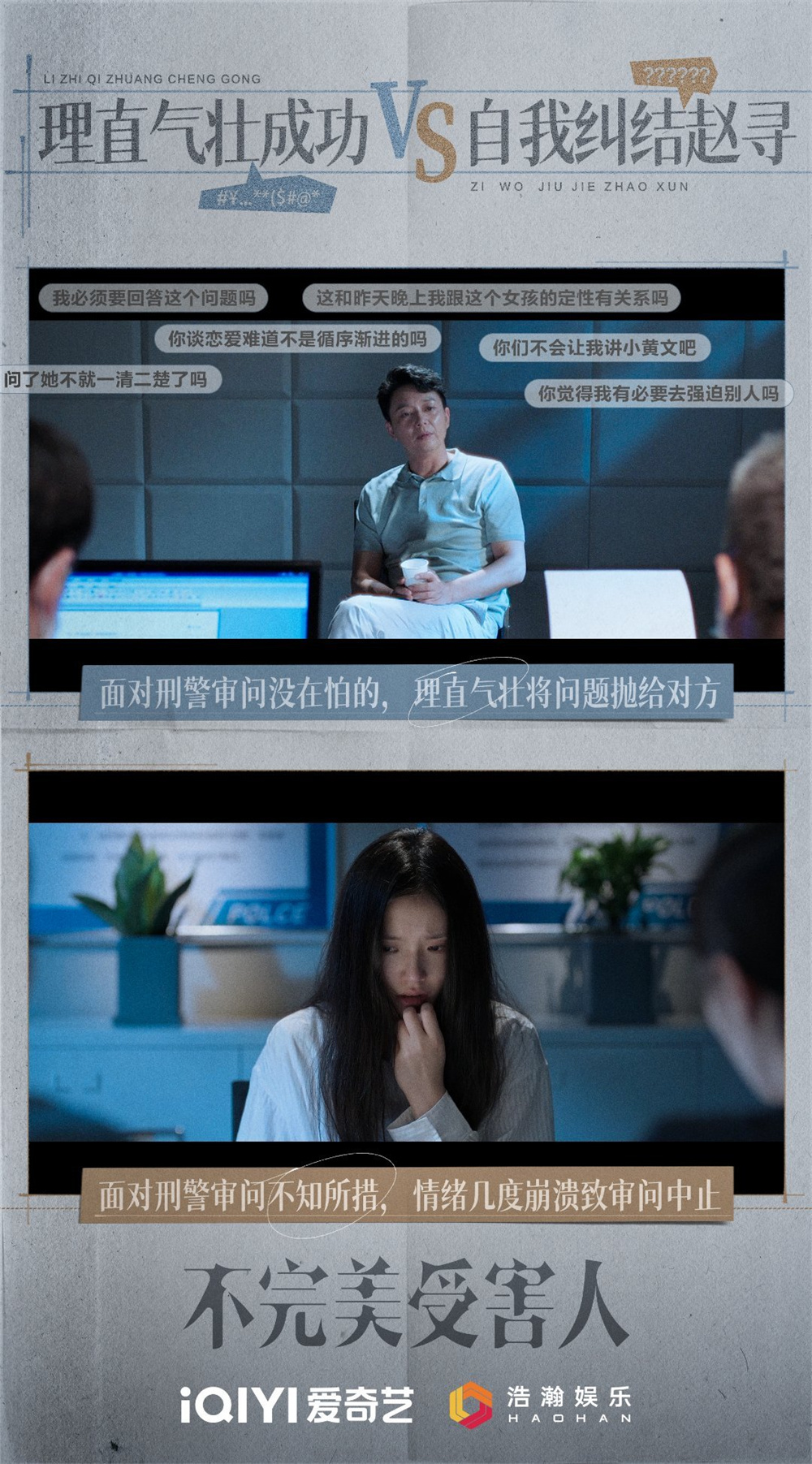
I don't mean to push back, but I, who had just been shattered by some film and television dramas titled "female themes" in the summer, were indeed saved by "Imperfect Victim". "Imperfect Victim", it really dares to shoot and criticize, and it hits the most accurate target. I would like to call it a two-way rush and two-way redemption of female themes and female creative production teams.
The story tells of a rape case with multiple reversals and many doubts. "Sexual assault" and "sexual harassment in the workplace" are not uncommon in film and television dramas in recent years, but not many can dissect the texture of the incident and delve into the situation and psychology of each character. In "The Imperfect Victim", the characters involved in this case: the victim Zhao Xun, the suspect Chenggong, the suspect's lawyer Lin Kan, the criminal policeman Yan Ming and other characters appear in turn. Their remorse and fear, arrogance and complacency, and insight into the fire intertwine into a very realistic urban black allegory, and it is an allegory with real social warning and reflection value.

The Imperfect Victim poster
Among the many characters, the first thing that must be mentioned is "Success" played by Liu Yijun. In the past, we have seen too many film and television images of obscene, violent and perverted sex offenders, so many that it even left a stereotype for many women. It seems that those "bad guys" who destroy and trample on women should be like this. As everyone knows, the sex offenders who often make women fall into the trap unknowingly are the most terrifying.

Liu Yijun as Success
Successful, as the name suggests, the owner of a listed company is wise, elegant and personable. Although he is married, he has many female partners around him. He "respects women" and will take off his suit and cover Zhao Xun after he is drunk, so he is a gentleman! But Zhao Xun was drunk by him and all the male superiors present.
After the incident, when facing the victim's father, he was able to analyze in detail, from the truth of the matter (his point of view) to "assuming responsibility", and arranged step by step, so that the other party, who is the family member of the victim, unconsciously followed his logic and became confused: "That man (success) was very polite to me, and I didn't care about beating him."
Success even does not feel that he has committed a crime from the bottom of his heart, thinking that this is a wishful thinking brought about by his mature charm. Facing the rape allegation, his reaction was: "I didn't expect such a decent person to encounter such a disgraceful thing."
When facing the victim's accusation of rape, he will also have a tolerant and understanding face: "A young girl lacks social experience and ability to bear, and suddenly a basin of dirty water is poured over, and the blame is placed on me. I can understand it. Be more tolerant." As soon as I saw these lines, I felt that the play was done.
It accurately portrays a very deceitful villain, who is evil and unaware, unaware (or pretending to be unaware) of the victim's disparity in economic status and social experience, and the psychological repression brought about by the superior-subordinate relationship. The role played by this kind of psychological suppression in this case, not to mention the victims in the case, even the audience watching the drama may not be able to immediately realize it.
Because his "evil" comes from the absolute control over others for a long time, and from a certain kind of extremely inflated male self-confidence. Under the influence of these control and male self-confidence, he beautifies inertial derailment as charm, sexual harassment in power as flirtatious pursuit, and carefully outlines "maliciousness" as a "decent", "gentleman", and even "affectionate" skin, deceiving both the victim and himself.

Successful Cognitive Contrast
Several other female roles are also very interesting. First of all, Li Yi, played by Dong Jie, is one of the many successful "harems". As a good helper in a successful career and a good lover in life, she stands firmly on the side of the perpetrator with a female body, "ping things" for him, and even jealous of him. She passed the verdict on the rape accusation of the victim Zhao Xun: "I tried to get something for nothing, but in the end I was stripped naked, so I told a lie to cover up my vanity", and only had to stick the words "slut" and "fishing girl" on the victim's face.

Dong Jie as Li Yi
But you said she really didn't know anything about the victim's situation? How can it be. At the dinner party, she saw the victim being drunk by a group of men. She knew what kind of scene it was, but chose to ignore it. The way she dealt with the men present was even more sophisticated, with a hug and a word of coquettishness. She had obviously been experienced in this kind of occasion. She knew what kind of gestures some men at the wine table wanted to see and hear from women, and she was used to it. I am very much looking forward to the follow-up excavation of this character. What kind of person was she once? How did you become a successful lover? Is she a "natural" accomplice, or has she started to uphold a certain "if you can't beat it, join in and profit from it" philosophy after being numb from the injury?

Chen Shu as Xin Lu
Chen Shu played the successful wife Xin Lu, and established an anti-routine "principal" image with just one scene of confrontation with Liu Yijun. Knowing that her husband's suspicion of rape was known to everyone, my sister came home in black, not to question her current husband, but to attend the funeral of her ex-husband. A negotiating scene, not spilling blood but talking about interests, threatening sonorously, and hugging her husband's subtle body language, I would like to call it the silent version of "Zhen Huan's sentence to Shiro, 'You make me sick'".

Zhou Xun as Lin Kan
The lawyer played by Zhou Xun, Lin Kan, did not fall into the stereotype that the common protagonist of domestic crime dramas always "stands on the side of justice". There is no doubt about her professional skills, and there is no doubt about her professional skills. Standing, restrained and polite, keeping a distance, not talking nonsense and making meaningless comfort, but always investigating the truth and observing the victim.
This is like a professional lawyer, "You are buying my professional services, and I will not make moral judgments on you", unless "you really committed a crime". Lin Kan's choice in the future will not be based on cheap sympathy, but will be determined by the truth. The most interesting thing is that when Zhou Xun faces Liu Yijun's performance, when she hears the successful romantic and confident remarks, her face is calm, but the energy of "I'm so annoying, my mother and professionals can't roll your eyes at you" that she tries to restrain in her body is really ready to come out.

Lin Yun as Zhao Xun
Let’s talk about the victim, Zhao Xun. The play is called "Imperfect Victim", so, what is the "perfect victim" of a sexual assault case? Let me draw a picture for you to feel: You were innocent before the incident, resisted desperately during the incident, and pursued justice afterwards. But even such a "perfect victim" has to bear all kinds of terrible evaluations, such as humiliation, "Why don't you rape others and rape you?" Whether it is humiliation or regret, its foothold is ridiculous: they put the continuation of the value of female individual life on a forced sexual act.
Then, Zhao Xun is of course an "imperfect victim" in this evaluation system: first, she failed to express her attitude in time during the whole process of successfully expressing her intention to "pursue" her before the incident; It can be said that, as a victim, her performance before and after the event was "disappointing".

Chenggong and Zhao Xun's attitude towards the police reflects the difficulty of women.
But why was she so "wavering" and "repeatedly hesitating" that she even denied rape at the beginning? On the one hand, it is the psychological repression brought about by the power relationship mentioned above, and it is the fear and consideration of her own reputation, external evaluation, and future development; on the other hand, it may be really difficult for her to determine "whether I was raped or not". Violent coercion rape is easy to identify, but psychological pressure and long-term PUA bring about the fear of resistance and embarrassment to resist, but it is difficult to detect. Afterwards, while the person feels humiliated and fearful, he may have to return to painful memories repeatedly to confirm various details. "Did I refuse clearly?" "Did I give the other party sexual hints?"
As for one's own reputation, there is a dialogue between police officers in "The Imperfect Victim", which discusses this. "Wouldn't it be better for the reputation to say it was rape?" "Not necessarily." Yes, not necessarily. As mentioned earlier, the perfect victim is unavoidable to be criticized, let alone "imperfect"? After the incident, the truth has not yet been clarified. Li Yi, who is also a woman, raised the question of "fishing for a girl", the humiliation from her colleagues, "she is not good-looking, why should she", "the coquettish sex in bed", and even the question from the supporters around him, "standing and standing", all came to Zhao Xun.
All in all, regardless of whether this is a crime of sexual assault or not, what they focus on is how much "sexual value" Zhao Xun has as a woman, and what "benefits" she has obtained in exchange for "sexual value". What a horrible description, but how true. In addition, it is difficult to obtain evidence for this rape that lacks violent elements. It is extremely difficult for Zhao Xun to prove himself. What he has to face is round after round of "battles" and tearing the wounds in his heart again and again. It is difficult to obtain evidence of rape, but "adultery" can deceive oneself and restore a certain "reputation".
In my opinion, Zhao Xun's denial of rape also has a mentality of self-protection. In the dialogue collection "Beginning at the Limit" between Ueno Chizuko and Suzuki Ryomi, the two talked about the "fear of weakness" of some women: "I don't want to be called a victim, and I can't bear the mentality of being a weak person. It's called 'fear of weakness'. They can't stand women posing as victims, thinking that 'I am different from them, I am not weak'."
Among all kinds of stigmatization of rape victims, in addition to the "chaste" theory based on feudal ethics, we also need to be wary of the "weak" theory based on some elitism: "Why are you so stupid and don't know to call the police?" And this kind of denial, in a muqiang world, may also be a great humiliation to the victim. In order to avoid this kind of humiliation, "fear of the weak" occurs. Compared with the label of "victim", it is better to label yourself as a "scheming woman", at least in a certain sense of "strong", even if it is extremely weak and ridiculously "strong".

Zhao Xun, success
When the victim is struggling in confusion and pain, what is the outside world's evaluation of success? After the incident, the director of Chenggong Company said, "If we want to make this kind of mistake, we don't necessarily have a chance." It must be "Cheng Dong is rich, beautiful and attractive." Seeing everyone smile knowingly at the director's "silence" at the meeting, how do you feel outside the screen at the moment?
Our value judgments on people and things often come not only from the simple values and sense of justice in our hearts, but also from class positions and interest distribution. The directors, the "Lee Yi", have an absolute mutual interest in success and therefore stand by his side. Lin Kan, as an attorney, is bound but not strongly related to the interests of success, so she seems to be taking money to do things, but in fact she is relatively neutral. Apart from Yan Ming, the criminal policeman who represents the dignity and justice of the law, Lin Kan is the one who is most likely to fight back against success in this drama.
Not only because of her professional identity, but also because of her class identity. The middle-class intellectual elite represented by Lin Kan has stronger power and resources than the weaker victims, but she does not have the "in-group preference" of the same circle as the superiors; This role, not only as a lawyer, bears the righteous expectations of the screenwriter and the society for this profession, but also as a class, it carries the society's certain value expectations for the middle-class intellectual elite.
"Female themes" seems to be the traffic code of the film and television industry in recent years, but female themes should not only have the labels of "big heroine", "strong woman" and "sister dog", and the opposition of "death to scumbags" and "safety without marriage and infertility", but should go deep into the most ambiguous and obscure "difficulties" of women's situation.
For example, before the incident happened, the men at the wine bureau commented on Zhao Xun, not their ability to work, but "You little assistant girl, you want to have a good looks, a good figure, and a good figure, and you are really lucky to be able to drink." What kind of good words are these? No, they already regarded Zhao Xun as a bag of success. (If you don't agree with this judgment, think about it, how many men have you seen face-to-face by the superiors saying "handsome and sexy" and "the boss is blessed"?)
This compliment to Zhao Xun is a compliment to the charm and power of success, a beautiful pendant, a sex toy that he can play with, essentially the same as a compliment to his luxury car. But what can Zhao Xun do at this time? Rebuttal? Do you lift the table and leave as written in the cool article? Will people think you are making a fuss? Will it affect the project being discussed, the views of the leaders, and future promotions? In reality, most of the "Zhao Xun" smiled awkwardly, and reluctantly drank the white wine in the glass, "The leader has praised me, I did it, you can do whatever you want."
In reality, the difficulties faced by women include obvious difficulties and difficulties under the water. Those women can empathize with, vague obscenity, obscure coercion, subtle humiliation, and helpless self-deception, just like the cold duckbill pliers dilator in the close-up shot of director Yang Yang during the female physical examination in the play. Many of your pains, like a stick in your throat, but you are ashamed to speak, are finally boldly "turned over the table" by this female screenwriter and female director team. "Girls help girls" is not the exaggerated and false girlfriend revenge in some film and television works, but I understand your most obvious trauma, and I understand your smallest hidden pain.


